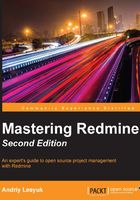
Installing Redmine from a package
To install Redmine from a package, we will use Debian jessie 8.2. Usually, I would recommend that you use Ubuntu server Long Term Support (LTS) instead. I would did this because it's more popular and has a larger community, but the Redmine version that comes with Ubuntu LTS is too outdated to be reviewed in this book (it's currently 2.4). However, Ubuntu LTS is largely based on the Debian stable repository, so the installation procedure should be the same for both systems (to make sure that it will be, I'm also going to use Ubuntu-style commands). Also, this in turn means that the very next Ubuntu LTS version is going to come with the version of Redmine that is currently shipped with Debian stable distribution. So, it can be said that we are going to use the future version of Ubuntu Server. Additionally, I personally prefer Debian stable over Ubuntu as the former is an older Linux distribution, is the original one, and has a more professional community.
Note
Note that the version of the Redmine package in the Debian stable repository is stated to be 3.0~20140825, but when installed, Redmine itself shows 2.5.2.devel. In fact, it's not really 2.5 as it, for example, runs on Rails 4, but it's not completely 3.0 either. As I have mentioned, it's an intermediate between 2.5 and 3.0 (with respect to functionality, it's perhaps closer to 2.5). The displayed version is 2.5.2.devel as the Debian guys took a code snapshot of the 3.0.0 branch, in which the version had not been fixed yet (that's why it's suffixed with .devel).
I assume that you have already installed Debian 8.2 (or a more recent version, or Ubuntu Server LTS). If not, please do it! Also, assuming that you have a clean installation and will need to install Apache, MySQL and so on—that is, everything needed to run Redmine. But don't worry if some of these applications are already installed. It will still be safe to execute the specified commands, as the Debian package manager is smart enough to skip such packages.